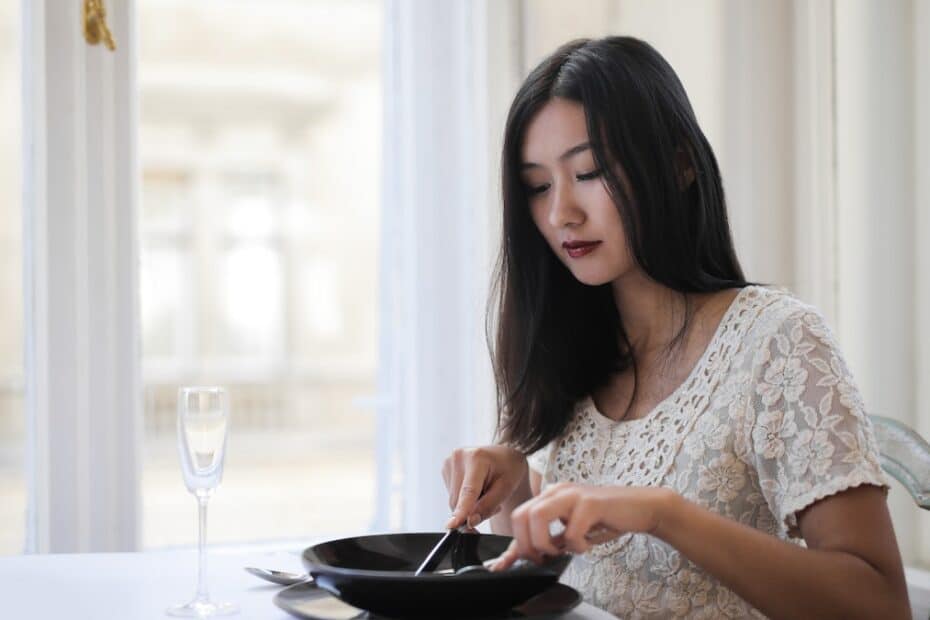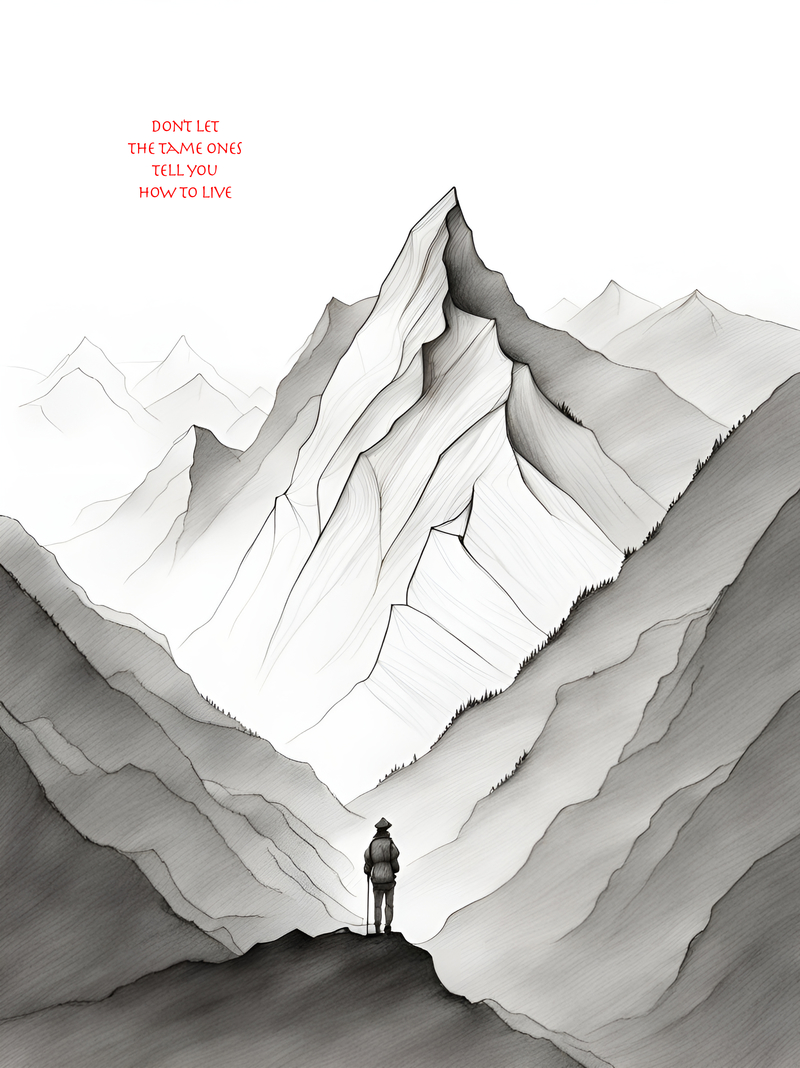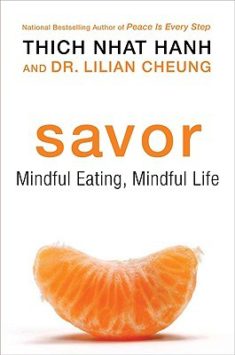Excerpt: The following is an excerpt from Savor by Thich Nhat Hanh and invites you to join Chef Sati at his house for dinner and a lesson in mindful eating. Enjoy!
NEW In The Shop: Don’t Let The Tame Ones Tell You How To Live [Poster]
Why We ♥ It: Some of the best advice I (Matt here) ever got was: don’t take life advice from people who aren’t living a life you want to live and don’t take criticism from people you wouldn’t go to for advice. I created this poster to act as a reminder to listen more closely to our role models and less closely to our critics, trolls, and tamed-comfort-zone-hugger acquaintances. It’s also a perfect gift for the outdoor adventurer, travel enthusiast, or solo explorer (or soon to be). Available in print or digital download. 👇🏼
...Want to advertise your book, product, or service? Send inquiries to matt@movemequotes.com.
Chef Sati – a chef and Buddhist teacher – invited us to dinner to introduce us to the art of mindful cooking and eating. He promised that his dishes would enlighten our senses and that the evening would simply be an opportunity to touch the joy of life, but we would all have to take an active part in the meal.
He placed an array of colorful vegetables, whole grains, and spices on the counter. As we washed the vegetables, he said, “In these vegetables, I see the sun, the earth, the clouds, the rain, and numerous other phenomena, including the hard work of the farmers. These fresh vegetables are gifts of the universe. Washing them, we know we are also washing the sun, the earth, the sky, and the farmers.” Because we were attentive to what we were doing, we touched the interdependent nature that makes life possible and felt deep joy to be living in the present moment.
The host made a wonderful soup with mushrooms; a salad bursting with red, yellow, orange, burgundy, and green colors; oven-fresh whole-grain bread with nuts; and, along with other dishes, what appeared to be a chicken dish with a wonderful sauce, decorated with green onions and cilantro.
The kitchen was filled with brilliant colors and fine textures of various ingredients, aroma from different herbs and spices, sizzling and bubbling music from the stove – all leading to the mouthwatering dishes that were masterfully prepared. All of our senses came alive. Working together, we prepared all the dishes in no time at all.
As we sat down around the dinner table, we looked at the empty plates in front of us that we were eager to fill with the scrumptious food that Chef Sati had assembled in the middle of the table. He gently exclaimed, “It’s so wonderful for us to be together, and I am so grateful we can share this dinner because in many other parts of the world, our empty plates might remain empty for a long time. Eating is a very deep practice. Let’s learn to eat with compassion and understanding.”
There was plenty of food on the table, but he suggested that we start by taking only a small portion first. Following his cues, before we served ourselves we smiled at each other, looked at the food, and smiled to it with gratitude.
When we picked up our piece of bread, we did not devour it immediately. Behind the tenderness and the inviting aroma of the bread, we tried to look deeply into it – to see the sunshine inside, the cloud inside, the earth inside.
We saw also all past generations of wheat plants leading up to the wheat of our times, as well as all the many generations of farmers and scientists who contributed to the evolution of the wheat and bread industry.
The bread carried a lot of love and care of many people, including our dinner host. When we had seen clearly the real piece of bread, we put it into our mouth and chewed it mindfully – chewing and tasting only the bread, and not the worries in our minds.
This way, we truly enjoyed the bread and could fully receive it as a gift from the universe. The piece of bread in our mouth was a miracle each of us was miracle, and the present moment of being together was also a miracle.
As we slowly ate the bread, soup, salad, and other dishes, we became fully aware of each bite, awakening all of our senses. We started to deepen our relationship with the food and to feel how we were all connected in a miraculous way.
Knowing the long history of vegetarianism in buddhism, we asked our host about the chicken dish. He said, “This may be a surprise to you, but the chicken dish was not prepared with real chicken meat. It is made with soy and wheat gluten, by infusing the glutinous protein with spices and sauces to simulate the flavor and texture of chicken. I included this dish to ensure there would be enough protein in the meal.”
The dish was indeed as flavorful as it looked. He further explained, “I don’t use real chicken meat or any other kinds of meats or animal products in cooking because it harms the environment and is not compassionate toward animals.”
The wholesomeness of the chicken dish was truly amazing, and we enjoyed every bite of it. We felt fortunate that we could sit down and enjoy a meal like this, being so present to the food and our friends.
After we finished our meal and had all commented on how good it felt to eat in this peaceful, mindful way, our host unabashedly asked us to help wash the dishes. We knew, of course, that there was another valuable mindfulness experience coming.
The idea of doing the dishes was not exactly fun. But once he stood in front of the sink and tenderly and joyfully cleaned the plates with as much care as he had cooked all the wonderful dishes, we rolled up our sleeves and took turns washing as well.
He explained that we needed to be mindful of everything we did, including the most mundane of chores such as dishwashing. We should be fully aware of the plates, the water, the amount of detergent, and each had movement with the sponge. We could was each dish with the same care we would use if we were bathing a baby.
We had to pay full attention to the task. Any distraction that disengaged us from the dishes would take us away from experiencing the present moment, a valuable moment in which we and the dishes are related.
Sounding like a light breeze, he offered, “We should do the dishes just to do the dishes. We should live fully in the moment while washing them, not think about dessert or about going home. Otherwise, we miss an important appointment with life.”
After we cheerfully finished putting away the dishes, we made a light, fragrant tea to accompany our dessert, which was a composition of fresh green, yellow, and red melons carefully cut in triangular wedges and presented beautifully on each plate.
Chef Sati showed us how to drink tea. He held a cup of tea in his hands, breathed in the fragrance consciously a few times, and said, “Conscious breathing will bring the body and mind together. When the mind and body become one, we feel solid and become fully present for the tea. As we drink our tea, we should be completely aware that we are drinking the tea. When we truly meet the tea in the present moment, we feel alive. Only then are we really living our life.”
After a few attentive sips, we all experienced that drinking tea had become the most important thing at that moment. The light green tea and delicious melons complemented each other perfectly.
As we relaxed into the evening, we felt nourished – not only physically, but also spiritually. We did not feel stuffed but rather perfectly satisfied, content, fortunate, and peaceful.
If you enjoyed this excerpt on mindful eating from Savor by Thich Nhat Hanh, you can find more quotes, resources, and info from the book below:
Book Overview: Common sense tells us that to lose weight, we must eat less and exercise more. But somehow we get stalled. We start on a weight-loss program with good intentions but cannot stay on track. Neither the countless fad diets, nor the annual spending of $50 billion on weight loss helps us feel better or lose weight. Savor teaches us how to easily adopt the practice of mindfulness and integrate it into eating, exercise, and all facets of our daily life, so that being conscious and present becomes a core part of our being.
Buy from Amazon! Listen on Audible!
Great on Kindle. Great Experience. Great Value. The Kindle edition of this book comes highly recommended on Amazon.
NEW In The Shop: Don’t Let The Tame Ones Tell You How To Live [Poster]
Why We ♥ It: Some of the best advice I (Matt here) ever got was: don’t take life advice from people who aren’t living a life you want to live and don’t take criticism from people you wouldn’t go to for advice. I created this poster to act as a reminder to listen more closely to our role models and less closely to our critics, trolls, and tamed-comfort-zone-hugger acquaintances. It’s also a perfect gift for the outdoor adventurer, travel enthusiast, or solo explorer (or soon to be). Available in print or digital download. 👇🏼
...Want to advertise your book, product, or service? Send inquiries to matt@movemequotes.com.

Written by Matt Hogan
Founder of MoveMe Quotes. On a mission to help busy people do inner work—for better mental health; for healing; for personal growth. Find me on Twitter / IG / Medium. I also share daily insights here. 🌱
It has taken me 1,000’s of hours to build this free library for you. If it has helped you, you can support my continued effort here. ☕️


